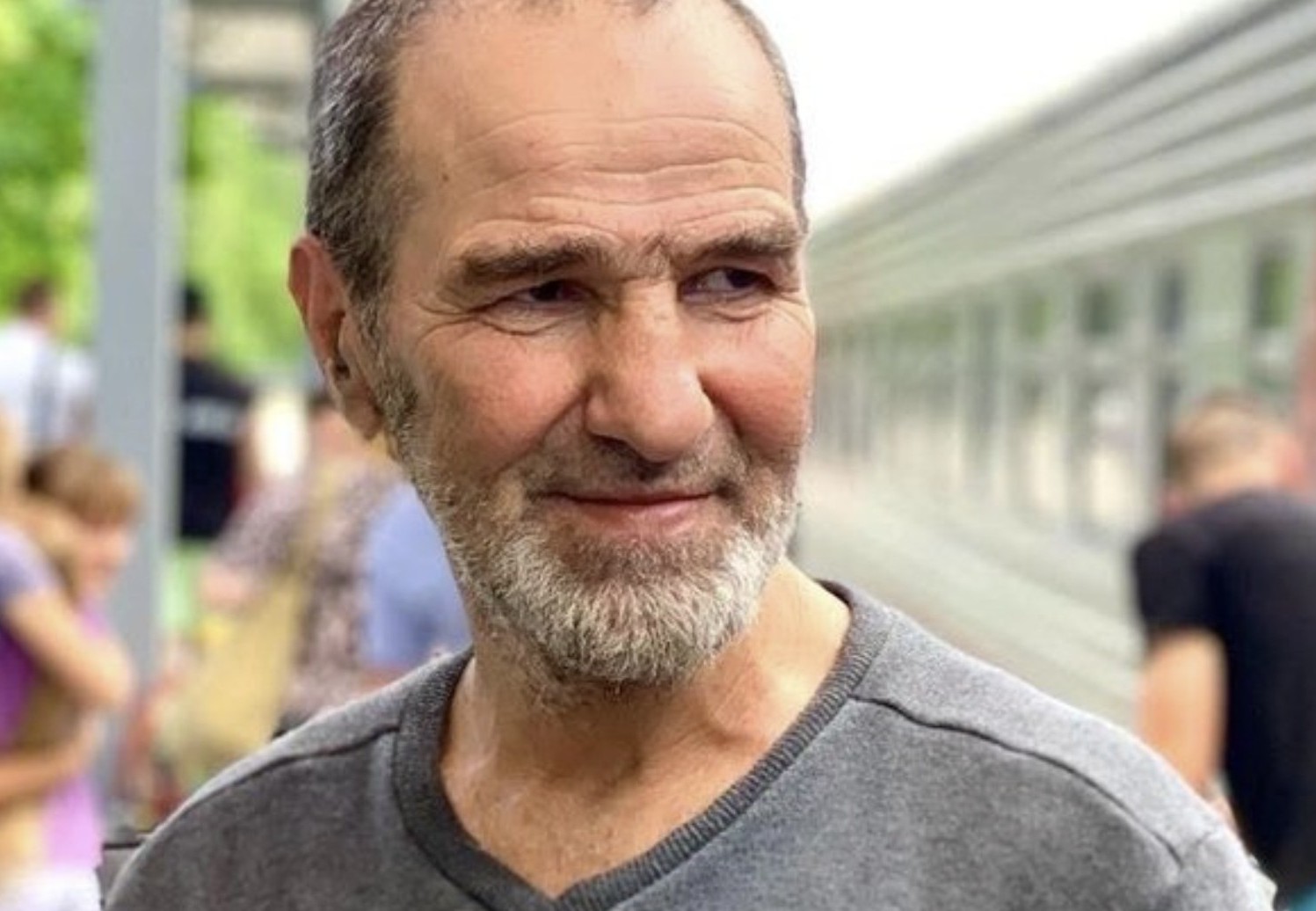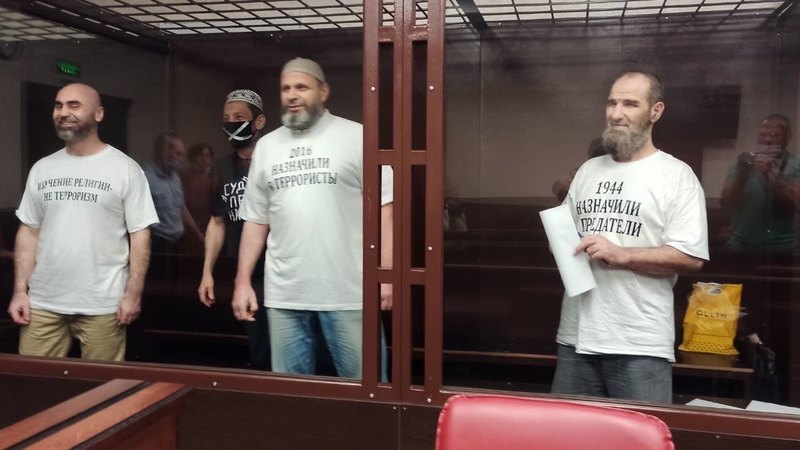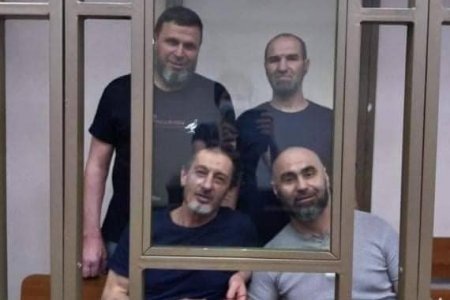
Russian brutality knows no limits, not even those imposed by its own legislation. Lenur Khalilov has been taken back into custody, less than two months after the 57-year-old political prisoner was freed from Russian captivity for health reasons. His release was in full compliance with Russia’s own regulations which lists cancer among the diseases which preclude imprisonment.
Lenur Khalilov should never have been imprisoned at all, and his release, together with those of the three other Crimean Tatar political prisoners with whom he was ‘tried’, had been constantly demanded by international bodies and human rights organizations. These demands had been ignored by two Russian courts and by the Russian penal service, as had been very clear health reasons for releasing several other Ukrainian political prisoners, including Dzhemil Gafarov, who was effectively tortured to death in Russian SIZO [remand prisons].
It seemed clear, therefore, in August 2025 that Khalilov’s condition must have been serious for him to be placed in a prison hospital almost immediately after he was transferred to a harsh-regime prison colony in Arkhangelsk oblast from the notorious Vladimir prison. It was there that a full medical examination was carried out, which identified a number of very serious conditions, including chronic hepatitis C; high blood pressure; cysts in the liver and one kidney and kidney stones. Critical to his release was the diagnosis, provided by an oncologist, of liver cancer which had already spread to lymph nodes. At this stage, it is only a question of time before the cancer reaches other vital organs and immediate treatment was prescribed.
If the cancer had already spread, it is very likely that symptoms were ignored at the Vladimir prison. There had clearly ceased to be any possibility of ignoring them, and the above diagnosis was given. Since malignant cancers requiring treatment are on Russia’s list of diseases which preclude imprisonment, Khalilov and his lawyer applied to the court for his release on the grounds of illness. The hearing before the Isakogorsk district court in Arkhangelsk took place on 20 August 2025, with the prosecutor, responsible for overseeing the prison colony’s compliance with the law present.
There was nothing at all subjective about the ruling passed by judge N.Y. Belaya, with this based solely on a qualified medical diagnosis which was very easily checked against the List of illnesses precluding imprisonment, passed by Government resolution no. 54 from 6 February 2004. On the basis of his “grave illness” and Russian regulations, the judge rightly concluded that Khalilov “cannot be held in a prison institution in general conditions and needs treatment in a specialized institution”.
Lenur Khalilov was released from custody a few days later and returned to a huge welcome back home in Crimea. While scarcely a breakthrough, after the horrific treatment and deaths of Dzhemil Gafarov; Kostiantyn Shyrinh and other political prisoners, it had seemed an achievement that a Russian court had complied with Russian law and freed the Crimean Tatar political prisoner.
That relief proved premature. As lawyer Emil Kurbedinov explained to Crimean Solidarity on 14 October 2025, Khalilov has already been taken into custody, following an appeal lodged against the Isakogorsk district court ruling by prosecutor N.S. Ryazanov. He applied to the Arkhangelsk regional court at the beginning of September, claiming that the court had not given “due assessment to other circumstances, including the attitude of the prisoner to the treatment carried out; his compliance with medical recommendations; his current state of health; the possibility of receiving the necessary treatment without release from the sentence; information about a permanent place of residence; relatives and family who can and agree to care for him and the actual need for such care.”
After this verbal nonsense, ‘prosecutor’ Ryazanov asserted that the earlier courts conclusions, based on the findings of a medical commission, “do not demonstrate the undoubted need for his release from serving the sentence.” As well as mentioning ramps and the like in the maximum-security prison colony, where the conditions are horrific for men in full health, Ryazanov then claimed, with supreme cynicism, that “the necessary medical care was provided in full measure.”
Kurbedinov explained that while the prosecutor had not denied that Khalilov has a grave illness, he had asserted that the recognized political prisoner is ‘a terrorist’, ‘a particularly dangerous criminal’ and that releasing him would not be just in relation to the public. “That’s how the law which envisages release of certain people was distorted.” Use terms like ‘formal illness’ and pretend that the conditions in a Russian penal institution, the medical equipment, etc, in the medical units which normal administer painkillers, at most, are somehow adequate. This is despite the fact that, according to Russian law, the fact of a cancer diagnosis itself is sufficient grounds for release. The ruling of the Arkhangelsk regional court, returning Khalilov to imprisonment, is, indeed, as Kurbedinov says, “inhuman and brutal”. It is also terrifyingly lawless and makes it clear that no humanitarian considerations will stop Russia exacting full reprisals against Crimean Tatar and other Ukrainian political prisoners.
Kurbedinov will be lodging a cassation appeal as soon as the full Arkhangelsk regional court ruling, with its ‘justification’, is published, however the fact that this ruling has been passed at all makes it difficult to feel any optimism.
Ryazanov’s arguments for dooming Lenur Khalilov to die very painfully in a Russian prison colony are profoundly cynical, as indeed were the charges Russia used for these and well over a hundred other arrests of law-abiding Crimean Tatars and other Crimean Muslims.
12-18-year sentences for religious independence and human rights activism

Lenur Khalilov (b. 8 December 1967) is one of four recognized Crimean Tatar political prisoners arrested on 10 June 2019. after armed ‘searches’ which made no pretence of looking for anything but ‘prohibited religious literature’. Ruslan Mesutov (b. 1965); Ruslan Nagayev, (b. 1964); and Eldar Kantimirov (b. 1980) were sentenced to 18, 13 and 12 years, respectively and remain in Russian captivity.
Although in most aspects one of Russia’s most notorious conveyor belt ‘trials’ where long sentences are guaranteed from the moment the armed searches begin, there was one specific detail. Lenur Khalilov was imam and head of the independent ‘Alushta’ religious community which the occupation regime was trying to crush, while Ruslan Mesutov was an active member of the community, as was another political prisoner and Amnesty International prisoner of conscience Muslim Aliev. The arrests on 10 June 2019 came just two weeks before the Alushta community’s legal challenge against the occupation regime’s seizure of the 19th century Yukhary-Dzhami Mosque which the community has legally occupied since 1994. Ruslan Nagayev was probably also targeted for his ‘religious dissidence’, while Eldar Kantemirov’s had actively defended political prisoners, with this, in occupied Crimea, enough to have the FSB come for you.
The men were accused only of unproven involvement in Hizb ut-Tahrir , a peaceful transnational Muslim organization which is legal in Ukraine. Russia became the first country in the world (joined in 2016 by Uzbekistan) to declare Hizb ut-Tahrir ‘terrorist in a 2003 Supreme Court ruling passed behind closed doors. with neither Hizb ut-Tahrir members, nor human rights NGOs given a chance to make submissions. No adequate explanation has ever been provided for labelling as ‘terrorist’ an organization which is not known to have committed, or even threatened, acts of terrorism or violence in Russia or anywhere else in the world.
Lenur Khalilov and Ruslan Mesutov were charged with the more serious ‘organizer’ role under Article 205.5 § 1 of Russia’s criminal code; Eldar Kantimirov and Ruslan Nagayev with ‘involvement in such an alleged ‘group’ (Article 205.5 § 2). All four men were also charged, under Article 278, with ‘planning to violently seize power’. The prosecution explained this truly surreal charge by claiming that the four men, as supposed members of Hizb ut-Tahrir, were planning a state coup via ‘“the total Islamization of the population”.
Just as there was no recognizable crime, there was no real evidence, only fake assessments’ by FSB-loyal ‘experts’ and so-called ‘secret witnesses’ who may well Such ‘evidence’, it should be stressed, is only of alleged involvement in a peaceful movement which is legal in Ukraine.
The ‘trial’ took place at the Southern District Military Court in Rostov (Russia) under presiding judge Roman Viktorovich Saprunov, together with Maxim Mikhailovich Nikitin and Rizvan Abdullayevich Zubairov, Like prosecutor Yevgeny Kolpikov, they had taken part in other such political ‘trials’, and provided the monstrous sentences demanded of them on 16 August 2021. The 18-year sentences against Khalilov and Mesutov; 13-year sentence against Nagayev and that of 12 years against Kantemirov – were all in the harshest of Russia’s appalling penal institution, with the first two years in a prison, the very worst, and then in harsh-regime or maximum-security prison colonies, which are all thousands of kilometres from the men’s homes and families in Crimea.
The sentences were all upheld on 14 August 2022 by the Vlasikha military court of appeal.



